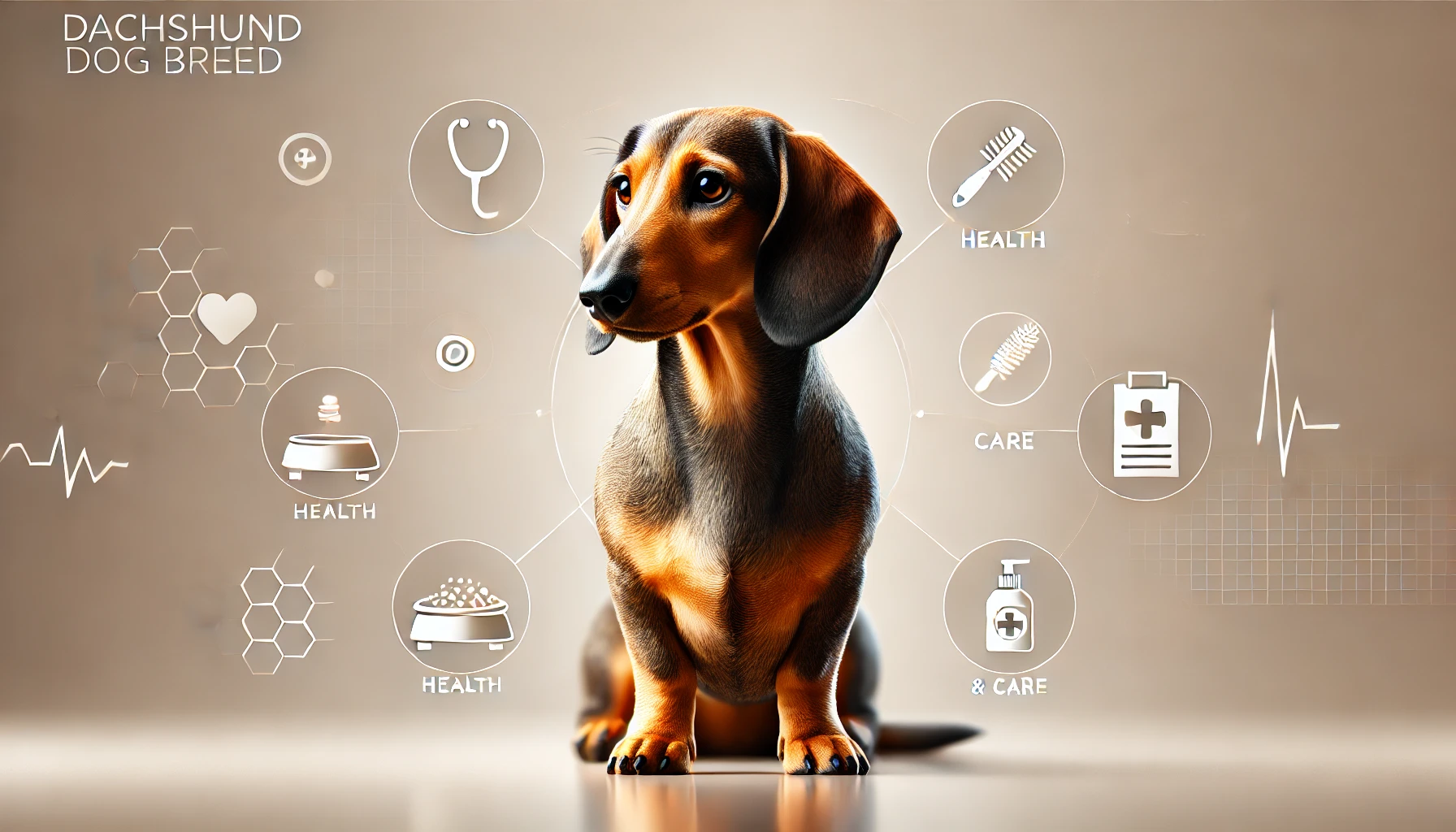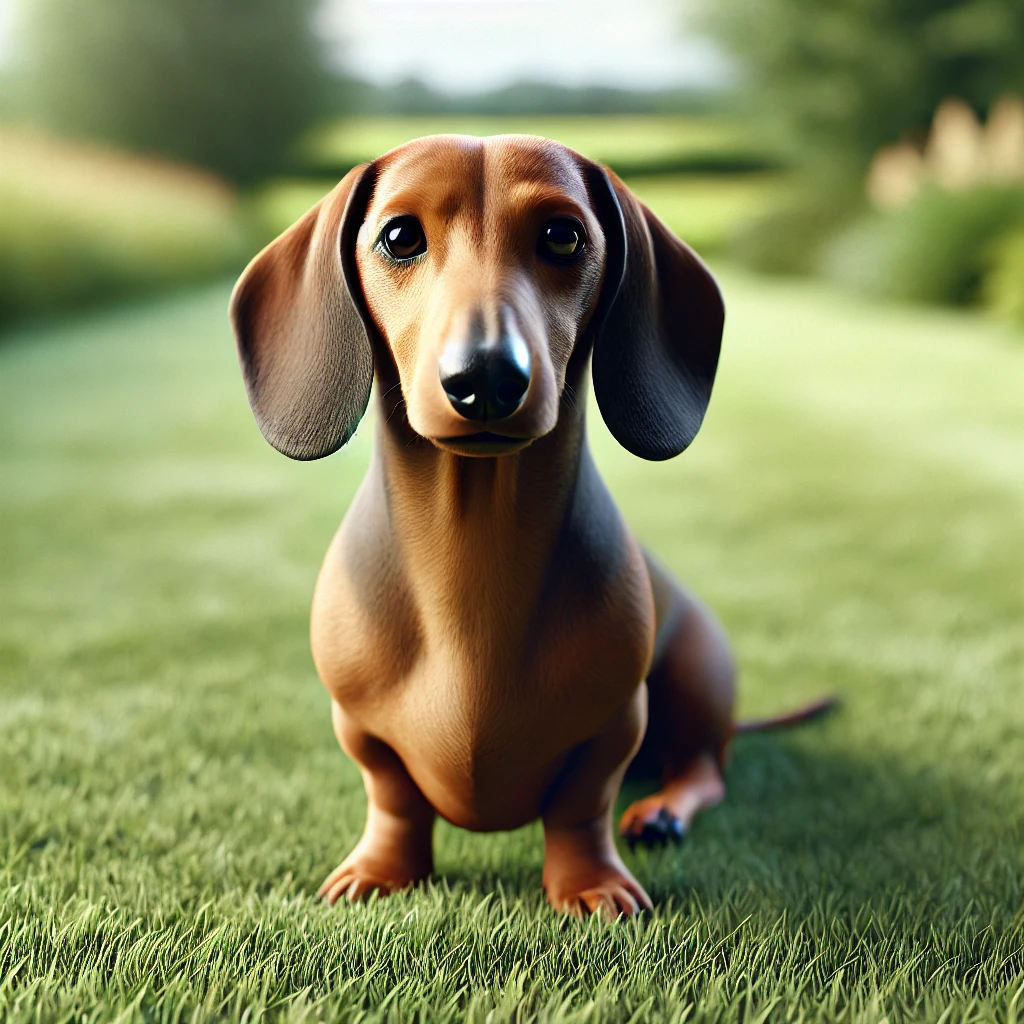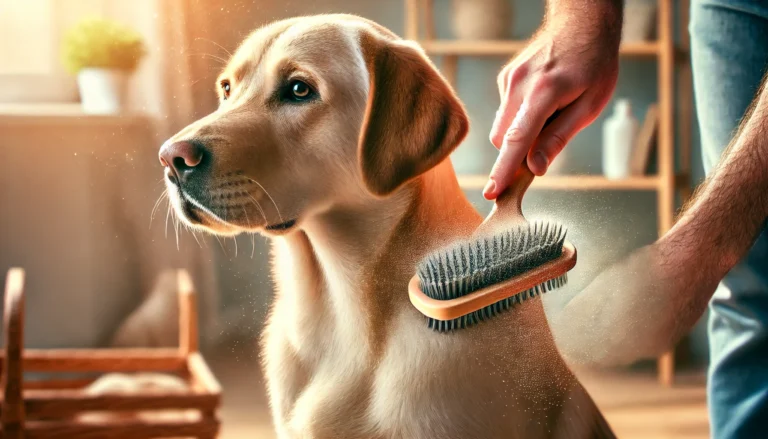dachshund (Wiener dog) breed: health and care

The Dachshund, often celebrated as the charming and spirited “wiener dog” is a breed beloved for its unique silhouette and vivacious personality. Known for their elongated bodies and brave demeanor, Dachshunds offer endless affection and companionship. This guide delves deep into every aspect of Dachshund care, ensuring that you understand how to maintain the health, happiness, and longevity of your furry friend.

Dachshund: A Breed Overview
History and Origin
- Nickname: Weiner dog
- Purpose: Bred in Germany for hunting, specifically badgers
- Recognition: Adored globally for their distinctive shape and endearing nature
Physical Characteristics
- Sizes: Standard and Miniature
- Coat Types: Smooth, Long-haired, Wire-haired
- Weight: Ranges from under 11 pounds (Miniature) to 32 pounds (Standard)
Temperament
- Personality: Curious, lively, and often stubborn
- Family Life: Excellent watchdogs, loyal to families, cautious around strangers
Comprehensive Health Insights
Common Health Concerns Dachshunds face specific health challenges due to their unique physique:
- Intervertebral Disc Disease (IVDD): A Common disease due to their long spine
- Obesity: A major concern that can exacerbate spinal issues
- Dental Issues: Overcrowding of teeth in their small jaws leads to dental disease
- Patellar Luxation: Dislocation of the kneecap affecting mobility
Preventative Health Strategies
- Exercise: Essential but should be moderate to protect their spine
- Diet: High-quality, balanced diet to prevent weight gain and support spinal health
- Regular Veterinary Check-ups: Early detection of potential health issues
Tips
Crate size for keeping a dog is of immense importance. If the size is not up to the standards, it might cause anxiety and other diseases.
Everyday Care and Management
Feeding Your Dachshund
- Diet Needs: Adapted to age, size, and activity level
- Feeding Schedule: Consistent meal times to avoid overfeeding
- Special Diets: For weight management and to address specific health issues
Exercise Regimen
- Type of Activities: Light to moderate activities, such as walks or gentle play
- Avoid: Activities that involve jumping or climbing, which can strain their spine
Grooming Essentials
- Smooth-Coated: Minimal grooming needed
- Long-Haired and Wire-Haired: Require regular brushing to avoid tangles and matting
Training and Behavior
Training Challenges
- Stubbornness: Can make training a test of patience
- Training Tips: Consistency and positive reinforcement are key
Socialization
- Importance: Prevents timidity and aggression
- Methods: Early exposure to various people, pets, and environments
Aging and Senior Care
Managing Senior Health
- Common Age-Related Issues: Arthritis, vision loss, heart conditions
- Care Adjustments: Enhanced veterinary care, adjusted diet, and modified exercise routines
A summary of Dachshund
| Category | Details |
|---|---|
| Life Expectancy | 12-16 years |
| Diet | High-quality dog food, suitable for their specific age, weight, and activity level. Avoid foods high in sugar and fat. |
| Sleeping Habits | 12-14 hours per day, including naps; prefer quiet, comfortable spots. |
| Care Needs | Regular veterinary check-ups, dental care, and ear cleaning. Monitor for signs of back issues. |
| Hazards | Keep away from steep stairs, jumping off high surfaces to prevent back injuries. Avoid foods like chocolate, grapes, and onions. |
| Mating Season | Typically once a year, but can vary. Responsible breeding practices are important. |
Interesting Facts About the Health and Care of Dachshunds
Dachshunds, affectionately known as “wiener dogs” due to their long bodies and short legs, are one of the most recognizable breeds in the world. These lively and charismatic dogs are known for their brave and playful nature, but caring for them requires understanding their unique physical and health needs. Here are some fascinating facts about the health and care of cute dog that every owner should know.
Spine Health is Crucial
One of the most distinctive features of the best pet is its long back, which makes them particularly prone to spinal problems, especially intervertebral disc disease (IVDD). To protect their spine, it’s crucial to prevent them from jumping off high surfaces and to maintain a healthy weight to reduce stress on their vertebrae. Regular, gentle exercise can help strengthen their back muscles.
Weight Management is Key
They have a propensity for weight gain, which can exacerbate back issues and lead to other health problems like diabetes. Monitoring their diet and ensuring they get regular exercise is vital. It’s best to provide them with small, measured meals rather than leaving food available all the time.
Dental Health Matters
Due to their small mouths, Dachshunds are also susceptible to dental issues. Regular dental check-ups and cleanings are important, along with daily teeth brushing if possible, to prevent gum disease and tooth decay.
High Prevalence of Heart Disease
This breed is prone to a condition known as dilated cardiomyopathy, a heart disease that affects the heart’s ability to pump blood effectively. Early detection through regular veterinary check-ups can help manage this condition through medication and lifestyle changes.
Grooming Needs Vary by Coat Type
Dachshunds come in three coat types: smooth, long-haired, and wire-haired, each with different grooming needs. Smooth-coated Dachshunds require occasional brushing, but long-haired and wire-haired varieties need more frequent grooming to prevent matting and remove loose hair.
They are a Breed with a Long Lifespan
Dachshunds typically live between 12 to 16 years, making them one of the longer-living breeds. Their longevity makes it even more important to invest in good health care throughout their lives to ensure they stay healthy and happy.
They Need Mental Stimulation
Dachshunds were originally bred to hunt, so they have a natural inclination for problem-solving and activity. Providing them with toys that challenge them mentally and promote active engagement can help manage their energy levels and prevent boredom.
Sensitive to Cold
Because of their short fur and low body fat, especially in the smooth-coated variety, Dachshunds are particularly sensitive to cold weather. During the colder months, they may need a sweater or coat when going outside to keep warm.
Conclusion
Caring for a Dachshund requires a dedicated approach to their unique needs. With proper health management, regular exercise, and appropriate nutrition, your Dachshund can enjoy a long, healthy, and joyful life. Embrace the challenges and delights of living with a Dachshund, and you will be rewarded with unwavering loyalty and affection.
Is a Dachshund a good family dog?
Yes, Dachshunds can be excellent family dogs. They are loyal and protective, forming strong bonds with family members. However, their bold nature may require careful handling around very young children.
Are Dachshunds good house dogs?
Dachshunds are well-suited to living in a house environment. They adapt well to indoor living due to their size and can be quite content as long as they receive adequate exercise and mental stimulation.
Does a Dachshund bark a lot?
Dachshunds do tend to bark quite a bit. They were bred to be alert and vocal while hunting, so they naturally tend to bark at perceived threats or to get attention. Training can help manage excessive barking.
What are Dachshunds known for?
Dachshunds are known for their distinctive long bodies and short legs, designed for digging and maneuvering through tunnels to hunt badgers. They’re also known for their brave and sometimes stubborn nature.
Is a Dachshund intelligent?
Yes, Dachshunds are intelligent dogs. They often use their intelligence in playful and sometimes mischievous ways, which can be delightful but sometimes challenging when it comes to training.
How much is a Dachshund worth?
The price of a Dachshund can vary widely based on factors like lineage, coat type, and location. Generally, prices range from $500 to $3,000 for puppies from reputable breeders.
What is the most expensive dog?
The Tibetan Mastiff is often considered one of the most expensive dog breeds, with some dogs selling for millions of dollars. However, high prices are typically the result of rarity and unique breeding.
What is the cheapest dog breed?
The cheapest dog breeds often include those most commonly found in shelters, like beagles or terrier mixes. Adoption fees can be as low as $50 to $200, making rescue dogs an affordable option.
Are Dachshunds cute?
Absolutely! Dachshunds are widely regarded as cute due to their unique shape, expressive eyes, and dynamic personalities. Their charming appearance and spirited character make them beloved by many.






